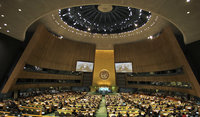UN General Assembly approves politically biased resolution on Crimea
The UN General Assembly adopted the resolution against the referendum in the Crimea. Yet, the document barely scored the required number of votes for approval. The U.S., Europe and their allies predictably voted "for", whereas eleven countries, including Russia, Armenia, Belarus and South American countries voted "against".

In fact, the UN General Assembly resolution is only a recommendation. Each country decides for itself whether it should execute the resolution or not. However, the Ukrainian Acting Minister, who represented the document, was eager to do this for everyone. He finished his speech with an ultimatum: those who did not vote for the resolution, jeopardized the UN Charter.
Russia's permanent representative to the UN, Vitaly Churkin, who was next to take the podium, explained to representatives of 193 countries, why Russia was opposed to the explicitly politicized document:
"In Kiev, legitimate power ceased to exist. Violence has become a norm of political life. In the Verkhovna Rada, violence targets the parties that make the parliamentary majority that supported Yanukovych. As a result, the Rada was redrawn, and instead of the government of national unity, the so-called "government of the winners" appeared. Those who committed the armed coup in Ukraine, call the shots in that government - radical nationalists, who profess, by definition of the European Parliament, racist, anti-Semitic, xenophobic views, who despise all Russian, who do not conceal that their ideological forefathers are Ukrainian Nazi collaborators."
The list of official co-authors of the resolution, which does not recognize the results of the Crimean referendum, are, in addition to Ukraine, Canada, Germany, Lithuania, Poland and Costa Rica. The U.S. is not on the list, and this is clearly a political move. Many in the room were fed up with constant attempts of the United States to take direct participation in global and regional processes.
U.S. ambassador to the UN, Samantha Power, said: "This resolution affirms only one issue - our commitment to the sovereignty and political independence, unity and territorial integrity of Ukraine. Adopting the document, we expressed a clear fundamental support to the preservation of the borders of this country."
Samantha Power did not say anything on the Kosovo precedent, for which Washington receives criticism, but she had to listen to representatives of Latin America, where the US does not feel shy to violate principles of sovereignty and political independence.
The idea of voting for the anti-Russian resolution did not find support with many countries. Among them, there are powerful regional leaders, including India, Brazil, Egypt, Argentina and China. All of them did not sign the document.
As a result, the voting was as follows : 100 - "for", 11 - "against", 58 abstained and 24 countries did not participate in the voting. Such a result does not account for qualified majority.
All EU member states and candidate countries, except Serbia, supported the resolution, like good disciples. Together with Bosnia, Serbia did not participate in the vote, along with representatives of 22 other countries, including, for example, Israel, Iran, United Arab Emirates, and several CIS countries. "Against" were Armenia, Belarus, Bolivia, Cuba, North Korea, Nicaragua, Sudan, Syria, Venezuela and Zimbabwe.
As for abstainers, there were many representatives of Latin America, South-East Asia and Africa. The latter usually vote the way Russia does, but this case was a special one. Russian Permanent Representative Vitaly Churkin explained that there was pressure put on those who disagreed.
"When preparing for this meeting, I visited several regional groups in the UN. Many countries complained that they were subjected to enormous pressure from Western powers to ensure that they vote to support the resolution. Probably, this pressure tactic, which our Western colleagues use, has produced a result, and some countries voted reluctantly. They told us about it, complaining of the pressure that they experienced. Nevertheless, I think the result is quite good for us. We have won certain moral and political victory," said the Russian envoy to the UN.
Meanwhile, the Ukrainian crisis will be the main topic for discussion at the next meeting of the UN Security Council. The ninth session will be held on Friday. As expected, UN Secretary General Ban Ki-moon will take part in the meeting. He is expected to deliver a speech about his trip to Ukraine.
Pravda.Ru
Subscribe to Pravda.Ru Telegram channel, Facebook, RSS!


